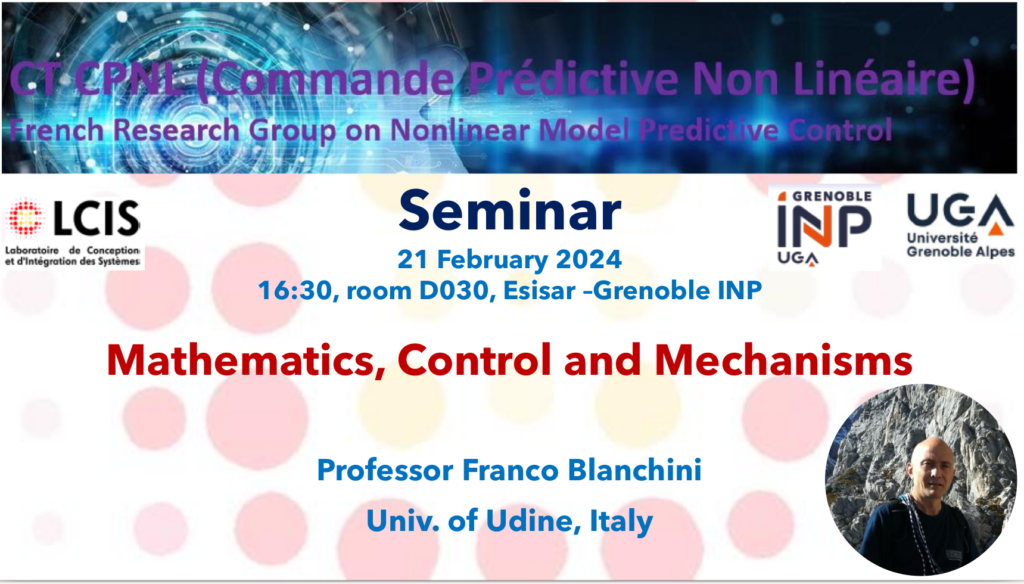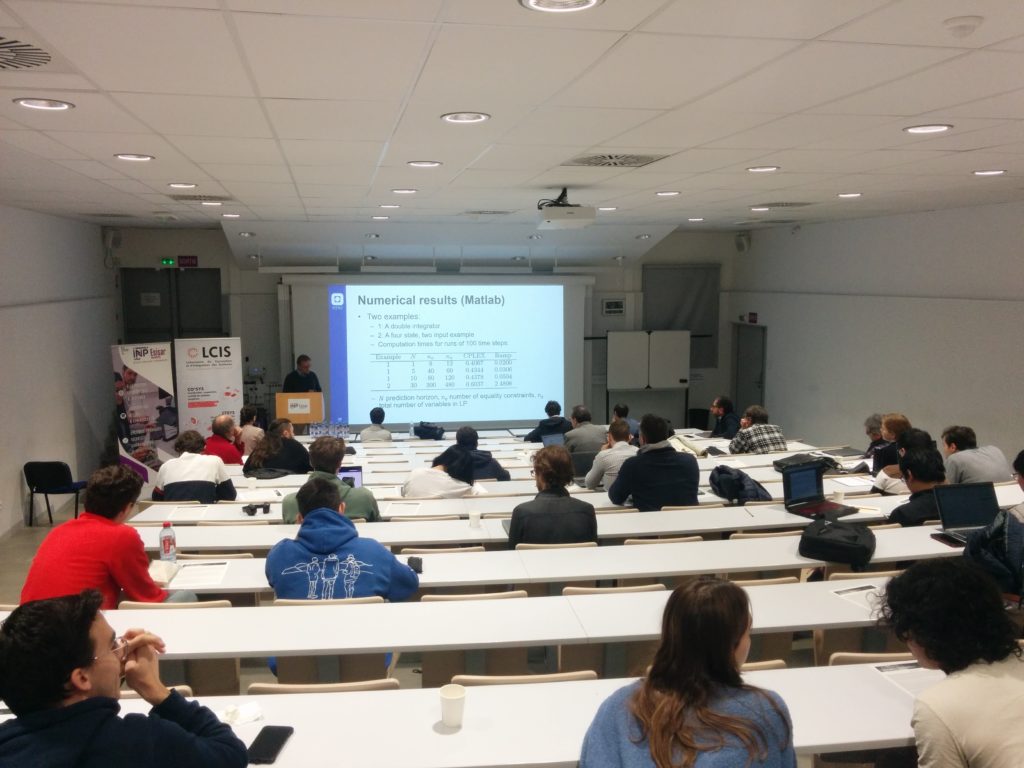Séminaire CT CPNL 21/02/2024

Title: Mathematics, Control and Mechanisms
Abstract: Systems and control theory has developed many techniques borrowing tools from different branches of mathematics. Interestingly, many of the techniques conceived and routinely used to solve control problems can be quite successfully adapted to solve new relevant problems, both practical and curiosity-driven, in other fields.
In this talk we discuss how the mathematical analysis of systems can be very effective in explaining how mechanisms work, why they work in a certain way and to which extent they perform their task properly even in the presence of perturbations and disturbances.
The first part of the talk briefly introduces some preliminary motivating examples of mechanisms, borrowed from other disciplines alien to control theory, to show how a control approach can be very powerful to understand fundamental principles.
The second part introduces the definitions of structural versus robust properties, discussing paradigmatic case studies from the literature. These include a discussion about robust stability/instability analysis, presented in an inverse form: ”We know this is stable, but why is it so incredibly stable?”. Other fundamental concepts such as adaptation, oscillations, bistability and graph loop analysis are considered.
The third part discusses application examples from biology and biochemistry, to showcase the potential impact that the mathematical approach of control and system theory, suitably revised, can have in these disciplines and how interdisciplinary research can bring fresh ideas to theorists.
Short Bio: Franco Blanchini is a Professor of Automatic Control and the Director of the Laboratory of System Dynamics at the University of Udine. His research interests are related to robust control via Lyapunov techniques, control of systems with constraints, robustness analysis, L1 and multi-objective control, control of production-distribution systems. He has been involved in the organization of several international events: in particular, he was Program Vice-Chairman of the conference Joint CDC-ECC 2005, Seville, Spain; Program Vice-Chairman of the Conference CDC 2008, Cancun, Mexico; Program Chairman of the Conference ROCOND, Aalborg, Denmark, June 2012 and Program Vice-Chairman of the Conference CDC 2013, Florence, Italy. He is co-author of the book “Set theoretic methods in control”, Birkhauser. He is the recipient of 2001 ASME Oil Gas Application Committee Best Paper Award as a co-author of the article “Experimental evaluation of a High-Gain Control for Compressor Surge Instability”. He is the recipient of the 2002 IFAC prize survey paper award as author of the article “Set Invariance in Control-a survey”, Automatica, November 1999. He later received the High Impact Paper Award for this work. He received the 2017 Nonlinear Analysis and Hybrid Systems Best Paper Award for he paper “A switching system approach to dynamic race modeling, Nonlinear Analysis and Hybrid Systems, vol. 21, no. 8, pp. 37-48, 2016. He has been speaker for the plenary lecture “Lyapunov and invariance methods in control design”, IFAC Joint Conference, Grenoble, February 2013; for the plenary lecture “Set invariance and Lyapunov methods”, 32nd Benelux Meeting on Systems and Control; for the semi-plenary lecture “Structural Analysis: The Control Language to Understand Mechanisms”, 59th Conference on Decision and Control – Jeju Island, Republic of Korea – December 14th-18th 2020. He has been an Associate Editor for Automatica, from 1996 to 2006, and for IEEE Transactions on Automatic Control, from 2012 to 2016. He has been an Associate Editor for Automatica, from 2017 to 2020. He has been Editor for IEEE CSS Letters from 2016 to 2018.
Réunion CT CPNL 16/11/23

Place: SALLE D030 Esisar, 50 rue Barthélemy de Laffemas 26000 Valence
Programme de la journée
| 9h30-9h45 | Accueil |
| 9h45-10h00 | Introduction à la journée Ionela Prodan & Sylvain Bertrand |
| 10h00-10h30 | Maintaining a relevant dataset for data-driven MPC using Willems’ fundamental lemma extensions Alexandre Faye-Bédrin, Stanislav Aranovskiy, Paul Chauchat, Romain Bourdais. IETR (Institut d’Electronique et des Technologies du numéRique), CentraleSupélec Rennes, France. |
| 10h30-11h00 | Nonlinear MPC for collision-avoidance trajectory tracking of a multi-UAV system in a mapping mission Dora Novak, Sihem Tebbani, Université Paris-Saclay, CNRS, CentraleSupélec, Laboratoire des Signaux et Systèmes, Gif-sur-Yvette, France. |
| 11h00-11h30 | Solving MPC problems using ramp functions Morten Hovd, Department of Engineering and Cybernetics, Norwegian University of Science and Technology, Trondheim, Norway. |
| 11h45-13h45 | Déjeuner et visite de la plateforme Esisarium |
| 13h50-14h20 | Distributed Moving Horizon Estimation with pre-estimation using Extended Kalman Filter for Nonlinear Measurements Matthieu Borelle , Sylvain Bertand , Cristina Stoica , Teodoro Alamo , Eduardo F. Camacho, Université Paris-Saclay, ONERA, Traitement de l’information et systèmes, Palaiseau, France. Université Paris-Saclay, CNRS, CentraleSupélec, Laboratoire des Signaux et Systèmes, Gif-sur-Yvette, France. Department of Ingenierı́a de Sistemas y Automática, Universidad de Sevilla, Sevilla, Spain. |
| 14h20-15h05 | A (small) step towards a systematic design of NMPC effective and implementable setting Mazen Alamir, CNRS, GIPSAlab, Grenoble INP, France. |
| 15h05-15h50 | Distributed predictive control based on Gaussian process models Alexandra Grancharova, University of Chemical Technology and Metallurgy, Bulgaria. |
| 15h50-16h00 | Coffee break |
| 16h00-16h30 | Computer-generated Control Lyapunov Function via offline linear programming Huu-Thinh Do , Franco Blanchini , Stefano Miani , Ionela Prodan, Univ. Grenoble Alpes, Grenoble INP, LCIS, 26000 Valence, France. Dipartimento di Matematica e Informatica, Università di Udine, Italy. |
| 16h30-17h00 | Terminal region enlargement of a stabilizing NMPC design for a multicopter Huu Thien Nguyen , Ngoc Thinh Nguyen , Ionela Prodan, SYSTEC–ISR, University of Porto, Porto, Portugal. Univ. of Luebeck, Institute for Robotics and Cognitive Systems, Luebeck, Germany. Univ. Grenoble Alpes, Grenoble INP, LCIS, 26000 Valence, France. |
| 17h00-17h30 | Mixed-integer predictive control for a three-phase electric arc furnace producing Silico Manganese Minh Tuan Dinh , Ionela Prodan , Olivier Lesage , Eduardo Mendes, Univ. Grenoble Alpes, Grenoble INP, LCIS, 26000 Valence, France. Eramet Ideas, Trappes, France |
Plenary Talks
Mazen Alamir CNRS, GIPSAlab, Grenoble INP, France, “A (small) step towards a systematic design of NMPC effective and implementable setting“
Abstract: It is needless to say that Nonlinear Model Predictive Control is currently the most effective and widely used feedback design methodology in academic works that address the control of constrained nonlinear systems. The theoretical foundations of NMPC are now quite established. Moreover free and easy-to-use programming frameworks that embed multiple efficient and trustworthy dedicated solvers for the NMPC-underlying optimization problems are now available. Nevertheless, practitioners still lack a systematic design procedure for the NMPC components (such as the control updating period, down-sampling period for prediction, control parameterization, prediction horizon’s length as well as the penalties on the terminal cost and the soft constraints) that enables the last step to be achieved, namely the real-time implementation on a specific computation target device. In this talk, the real-time implementation-related issues are first recalled. Then a framework that enables a systematic and rational design of NMPC design components is sketched. The rationale that underlines the design choices expresses real-time implementability, convergence and constraints satisfaction for a given computational device and a specific optimization algorithm. Finally, a freely available associated Python-based implementation is also proposed with a fully developed illustrative example before an overview of remaining-to-achieve tasks is proposed.
Alexandra Grancharova, UCTM Bulgaria, “Distributed predictive control based on Gaussian process models“
Abstract: A suboptimal approach to distributed NMPC is proposed based on Gaussian process models of the interconnected systems dynamics and taking into account the imposed constraints. The suggested method is based on a sequential linearization of the nonlinear system dynamics and finding a suboptimal solution of the resulting Quadratic Programming (QP) problem by using distributed iterations of the dual accelerated gradient method. The main advantages of the distributed approach are that it allows the computation of the suboptimal control inputs to be done autonomously by the subsystems without the need for centralized optimization and it has a simple software implementation. The proposed method is illustrated with simulations on the simplified model of a sewer system.
Téléchargements
Réunion CT CPNL 03/06/22
Place: SALLE 11A-3.33 (accès 11A, 3ème étage) au CNAM 292 rue Saint-Martin, Paris 75003
Zoom: https://grenoble-inp.zoom.us/j/6496005771
Meeting ID: 649 600 5771
Programme de la journée
| 10h00-10h15 | Accueil |
| 10h15-10h30 | Introduction à la journée Ionela Prodan & Sylvain Bertrand |
| 10h30-11h15 | Définition d’une approche de contrôle optimal et robuste adapté à des systèmes non linéaires – Application dans le cadre des systèmes d’air de chaînes de traction Evgeny Shulga, Patrick Lanusse (Stellantis – IMS Bordeaux) |
| 11h15-11h45 | Distributed Moving Horizon Localization for Multi-Vehicle System over a Sensor Network with Sporadic Measurements Antonello Venturino (ONERA – CentraleSupélec-L2S) |
| 11h45-13h15 | Déjeuner |
| 13h15-14h15 | Optimal Control of Wave Energy Converters: From Adaptive PI Control to Model Predictive Control Hoai Nam Nguyen (Telecom-SudParis) |
| 14h15-15h00 | An Assistive MPC-Based Control Framework for a Robotic Knee Rehabilitation Exoskeleton Ahmed Chemori (LIRMM) |
| 15h00-15h45 | Guidage d’un drone à voilure fixe par commande prédictive et réseaux de neurones pour la prise en compte des risques induits au sol Sylvain Bertrand (ONERA) |
| 15h45-16h30 | Tracking control for a class of flat system under disturbances. Insights on flatness-based MPC for a multicopter Huu Thinh Do (LCIS – Grenoble INP) |
Téléchargements
Contacts et informations
ionela.prodan@lcis.grenoble-inp.fr sylvain.bertrand@onera.fr